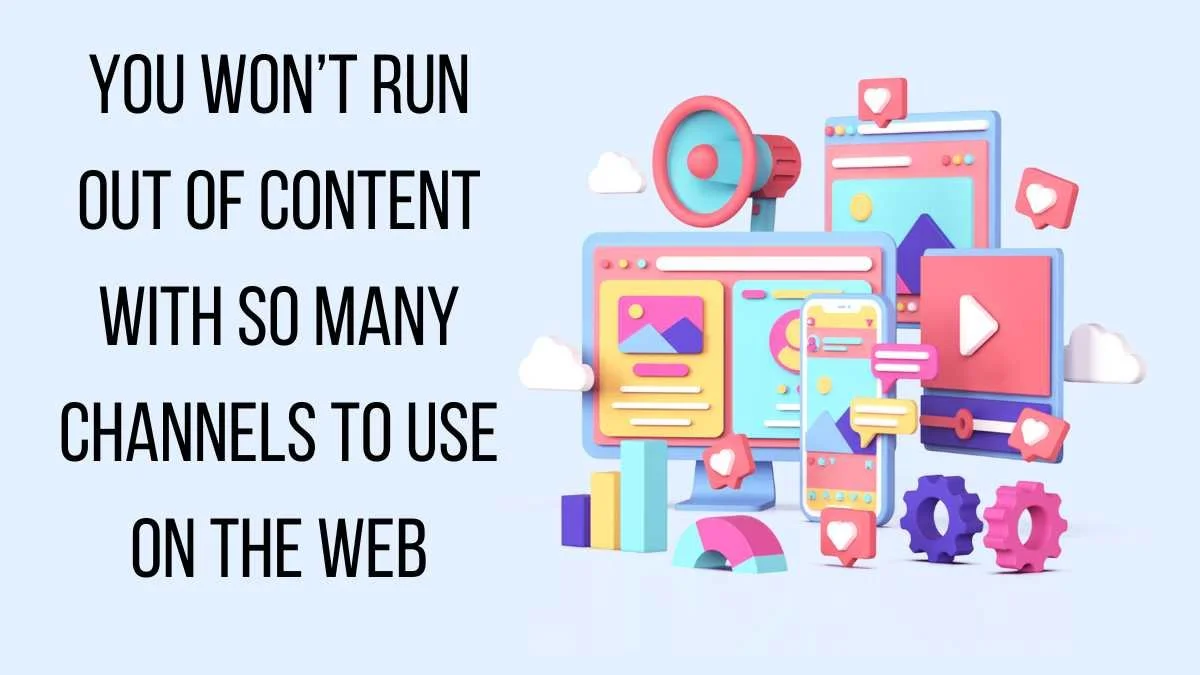Will We Ever Run Out of Content?
Will we ever run out of content? It’s a valid question, seeing as how so many people use the Internet 24 hours daily to create content.
This type of question is one we get a lot at Charlotte Content Marketing, along with questions like, “What do we write about? What more is there to say on this topic?”
The short and easy answer is that there is never a time when humans or the Internet will run out of content. Ever. Not in your lifetime, our lifetime, or any of your customers’ lifetimes.
Unless the Internet shuts down or it becomes nothing but bots, there will always be fresh, new content for the web. Why?
Is there an end to how much content that can be produced? DL;DR - NO!
We’re going to cover that more in-depth below, but the simple fact is that there is no way you can exhaustively cover a topic.
Even once you’ve covered all of the basics and advanced topics surrounding a topic, new things are happening every day.
Moreover, with over eight billion people on the planet, there are nearly limitless takes on different topics and billions of experiences and opinions.
This means there is always something you can talk about or some new way to talk about it. Now, whether that something adds value to a conversation is a different matter entirely, but once again, we will always have content.
Having trouble coming up with new content topics is common, but you can think your way through it
A Practical Example: Content Marketing for Medical Professionals
To offer a small demonstration of this point, we’ve been working with an agency partner on content about polycystic ovary syndrome (PCOS) for their medical client for the past two years.
In this role, we’ve been tasked to take care of content development and content marketing strategy, meaning we’ve helped to shape the written content for clients of this medical service provider as well as ensure SEO best practices are incorporated into the content for placement around the web to build authoritative backlinks.
So, over the course of a year, we’ve developed content about:
The causes of PCOS
PCOS side effects
How PCOS affects anatomy
Treatments for PCOS
Diet and exercises to lessen side effects
Questions to ask when seeking treatment
Technology innovations in PCOS care
Training and education for practitioners
Laws surrounding medical care
Medications to treat PCOS
Lifestyle considerations when dealing with PCOS
Surgical procedures to correct PCOS
The history of PCOS care
Preventative care for reproductive health
Choosing the right service provider
Insurance concerns with PCOS care
And much more!
All of this came from a simple idea to connect with patients of the medical care provider specializing in PCOS treatments.
You can always keep adding more content topics when you expand your horizons
We Could Create Even More Content
And the thing is that each one of these ideas can be broken down further.
For instance, we could take the different ways PCOS affects women and create patient education articles about each side effect. Then, we could create content about how to mitigate those effects.
We could also develop and produce detailed video and podcast content about each topic to offer an interactive component to the medical provider’s content marketing efforts.
With so many channels to use for content marketing, you will never run out of different types of content to develop
More Content Marketing Ideas We Could Use
Heck, let’s take things even further! We could then write about tips for PCOS care during September for National PCOS Awareness Month in the client’s email marketing newsletter.
We could create graphics on how PCOS affects each part of a woman’s body. We could post about a daily PCOS topic on social media to encourage engagement.
Lastly, and more importantly, we could get the client’s audience involved by holding live-stream Q&A sessions. Live stream content lets the medical client interact with viewers in real time to establish industry authority while creating a community of which the audience becomes a part.
And This is Just the Tip of the Iceberg
And this is just the tip of the iceberg, demonstrating how far you can take your content marketing efforts to reach customers and build upon your branding efforts.
The bottom line is that there is always something constructive to add to your content marketing strategy, and there will always be content to put on the web that is informative and helpful to connect with your customers.
Let’s Look at the Math
Vsauce did a fantastic video some years ago about answering the question, “Will we ever run out of new music?” Just like with digital content, it’s a valid question. It seems like we would run out of music just like we would run out of things to talk about since there are only so many notes and words out there.
But think about this for a moment: If we have nearly half a million words in the English language and virtually unlimited human thought, how long would it take to exhaust creativity?
The amount of combinations you can make from text alone is nearly infinite. We’re talkin’ crazy numbers here!
In the Vsauce example, Michael demonstrates that one five-minute piece of audio can be arranged into bits in different ways that total a number that is 63 million digits long. To even fathom this is maddening.
Now, consider words and thoughts for a moment. If a five-minute audio file can be arranged into many combinations that equal a number 63 million digits long, how much more complicated is human thought?
We would venture to guess that it is a tad bit more complex than a five-minute audio file in terms of content. What’s more, even if we consider the five-minute audio file, humans create that audio...and that’s just a five-minute piece of music!
When you consider all of the various stories, plays, books, papers, videos, audio, drawings, graphics, 3D models, and games humans could ever create, there’s simply no way we could ever run out of content.
Content clusters, revisiting old content, and doing audience research are easy ways to find new content ideas
How to Come up with New Ideas for Content
So, now that we’ve seen we’ll never run out of content, how do we tackle the problem of YOU running out of content? Meaning how do we find new things to create content around when we feel like we’ve exhausted a topic?
Use Content Clusters
Well, in content marketing, this gets into the topic of content clusters. A content cluster is a group of topics that are tangentially related. These are topics that not only allow you to expand your content marketing efforts but also demonstrate to customers (and search engines) that you are an authority on a subject.
For example, we work with a client who felt like his business needed more things to say regarding virtual office services. He had already created a lot of content about virtual offices and felt like he hit a dead end.
Creating content & keyword clusters can help break out of a content drought
What we did was break down the concept of virtual offices into a topic cluster. From that, we began creating content about virtual mailbox services since these are often included with virtual offices.
From that, we expanded much of the existing content, which was then tuned to talk about virtual mailboxes instead of virtual offices.
This significantly impacted the amount of fresh, valuable content the client was able to provide his customers, and it opened up a number of new directions for future content development.
In the end, this reached more people searching for virtual office and virtual mailbox services since the two are related, and search engines were able to understand that the client’s content covered both.
Sometimes a refresh is all your content needs to get your inspiration moving again.
Refresh & Repurpose Existing Content
When you create so much content each year, it can be easy to forget about some of the past pieces you’ve worked on. A solid content marketing strategy includes revisiting older content to review it for potential updates.
You may find inspiration in older content, as it’s easy to get sidetracked by the things you’re currently working on.
Additionally, refreshing and repurposing older content has the potential to impact search engine rank.
Checking over what you already have can give inspiration for new content ideas
For example, we had a client with a massive catalog of blog posts that spanned years of content. Unfortunately, none of the older content had ever been touched, and virtually none was ranking, meaning it never got clicks or led to a sale. In every sense of the word, it was wasted.
We solved this by completing a content audit, finding the pieces most likely to succeed with a refresh, and then updating those posts. While doing this, we found several new approaches to themes in the client’s industry that have changed since the original content was written.
This inspired new content, and we then developed that as well, improving search engine rank significantly for those pieces and the client’s online presence.
Looking into what your audience wants to get out of your content is a great way to generate new ideas
Ask Your Audience
Another way to come up with new content that is definitely going to provide value to your customers is to simply ask. Okay, we don’t mean to ask directly; instead, take the time to do your research.
Visit message boards that customers use to voice their frustrations or ask questions. Search social media posts and profiles for terms specific to your brand or industry.
The information you find by doing this can guide you in creating new content that’s meaningful to your audience. Why? Because it’s precisely what they’re looking for, and that’s the point of audience research and analysis.
For instance, this blog post right here, the one you’re reading right now, was borne out of repeated concerns from our clients over the years that there’s nothing more to write about or no further topics we can create videos for.
We can tell from experience – there is ALWAYS something to write about and ALWAYS some new angle you can take on a subject that hasn’t been done to death.
And it makes us happy when we can solve our clients’ problems so they can solve their customers’ problems. We love it when we make a difference for our clients who feel like they’ve hit a wall, and we’ll be glad to help you, too, if you’re feeling stuck.
Working together with a team of content marketing experts can help your content development efforts evolve
Content Marketing is an Evolving Process
Lastly, we want to make clear that content marketing is an evolving process. The content we produce grows and changes over time as our clients and their customers change. What was important a year ago may no longer be relevant.
For example, we would have been writing about on-page SEO a few years ago. With the introduction of AI-generated content, pure on-page SEO and backlinks (off-page SEO) are no longer enough. That’s why we’ve evolved our strategy and the topics we cover.
Now, not only is SEO important, but all of your content takes center stage. Content that doesn’t even give a link back to your site can be incredibly important if it positions your brand as an authority in your industry.
How content is written is also a much more important factor now than it was just a few short years ago.
Google and Bing have both made significant changes to their algorithms. With the introduction of SGE from Google and Bing’s usage of ChatGPT, we’re seeing many more changes coming to search engines in the future.
So, our own content marketing strategy is evolving, as are the strategies we develop for our clients.
No is the best time to get started in content marketing. Developing quality content now and sharing it across the web will play a pivotal role in the next few years as people will begin receiving search engine results from all kinds of sources on the Internet.
Your website is still essential, but virtually every mention of your brand can now potentially get factored into the equation.
Remember – we will never run out of content, and YOU don’t have to run out of content either. Take the time to consider content clusters, review older existing content, and check in with your audience to gain new ideas and approaches to your content marketing efforts.
Contact Charlotte Content Marketing Today - Let’s Talk About Your Goals
In the meantime, contact Charlotte Content Marketing for expert guidance tailored to your business’s unique needs. Call (704) 323-6762 today, or schedule online using our convenient contact form right now.













